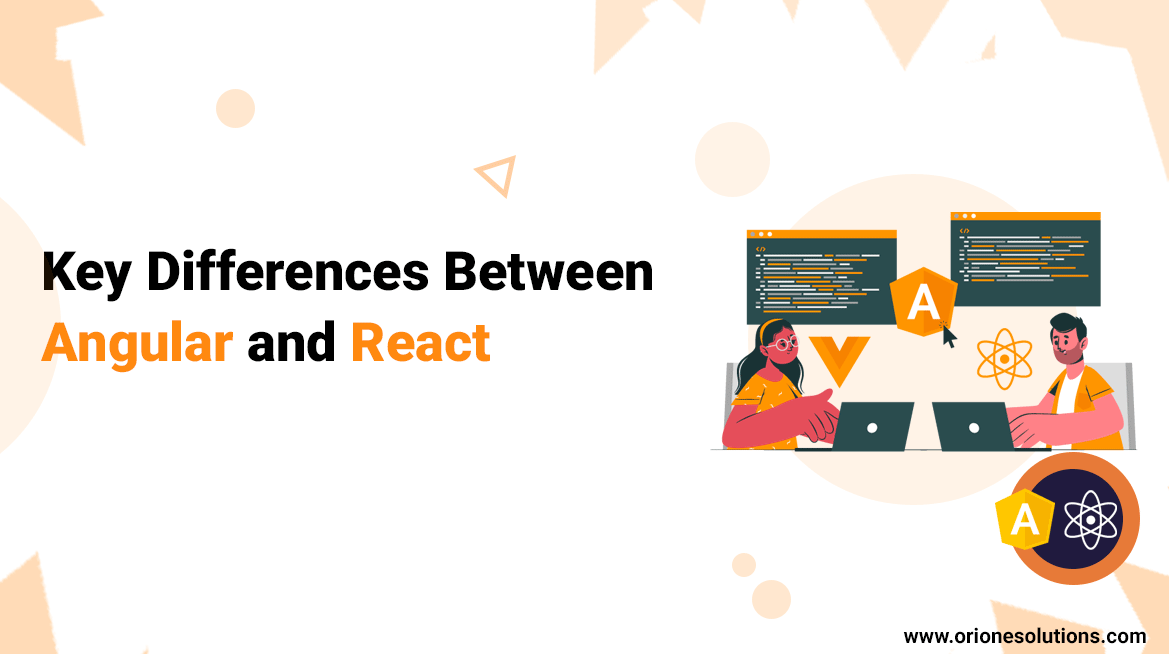Angular vs React, both the two widely popular frameworks highly preferred for successful software development. These offer in-built front-end functionalities that can be integrated into your projects while saving you from writing the code all down from scratch.
According to Statista, people use around 1.88 billion websites globally. Of all, React-based websites are 42.62% and 20.39% of websites are built using Angular framework. Now, the adoption of these two frameworks among front-end developers is increasing rapidly.
Though Angular and React have a lot of things in common, both vary in purposes. For example, React is a JavaScript library built with JSX, and Angular is a JavaScript framework built with TypeScript. React can be turned into a full framework by adding a few libraries. However, the resulting stack methodology is still different from Angular.
As a result, the debate around Angular vs React never ends, further putting the developer community at the crossroads of which one to choose.
So, in this article, we will cover the differences between the two and help you out in making the right choice.
Overview of Angular
Angular is one development framework developers leverage to build scalable and reliable web apps. It has a wide collection of well-integrated libraries and functionalities like AngularCLI, routing, client-server communication, and more to expedite front-end development.
Also, you can hire Angular developers who possess a set of development tools and expertise to craft and scale projects from single-grade size to large-sized apps.
Angular has become the choice of developers and businesses alike to build scalable apps as it uses TypeScript. Additionally, Angular leverages two-way binding, creating an organized sync between the view and model.
Overview of React
React is a front-end JS library ideal for front-end development and building user-friendly interfaces by reusing the available UI components. Its declarative views and component-based architecture allow developers to create rich and interactive user interfaces quickly and hassle-free.
Moreover, with its “learn once, write anywhere” principles, developers can create scalable, quick apps for any platform.
React frameworks provide the modern components that contribute to quick development time. It is widely used for mobile app development as it enables the developers to reuse the app’s logical section while only modifying the overall appearance of the app.
Core Difference Between Angular vs React
Angular and React are two widely known frameworks for development and are quite alike. However, what makes them most distinctive are their features.
Let’s discuss these core differences below to help you make a comparison and decide accordingly.
Performance
React appears to outperform Angular when it comes to runtime performance. The reason is the Virtual DOM trees are constructed on the server and are quite lightweight. In addition, React’s data-binding mechanism is also unidirectional, meaning fewer watchers are assigned to bindings, thereby minimizing the workload.
However, the case is different for Angular. It uses a bidirectional data binding process where each binding needs a viewer to monitor upgrades. Further, the loop is continued till the viewers are not confirmed. This results in the chances of the data binding mechanism impacting Angular’s performance.
Dependency Injection
The way that Angular and React handle dependency injection is another important difference to talk about. Dependency injection is a design approach that lets components request dependencies from outside sources instead of building them by hand. Here, Angular comes with built-in support for it. Thereby, encouraging code reuse, testing, and modularity.
On the other hand, React fails to offer native support for dependency injection. Rather, it leverages unidirectional data flow and depends on props for transferring data from parent components to child components.
Data Binding
In terms of data binding, Angular utilizes a two-way data binding approach. It implies that the model state automatically updates anytime an interface element does.
On the contrary, React employs one-way data binding. This approach delays rendering changes in the interface model until the model state does not change. Additionally, the model state stays unchanged no matter what modifications are made to the UI components.
While one-way data binding provides more control to React developers over the web and mobile apps, two-way binding used by Angular is a better choice. It is the most effective way to extract data from ERP-based apps and easily build solutions.
Code Quality and Maintenance
Angular developers utilize AngularCLI to predict compilation behavior and lower the learning curve. It produces seamless development and reduces the effort that developers must put into iterating, which ultimately usually results in poor code quality.
Also, it offers an HTML extension to address such issues and save valuable development hours.
With React also, maintaining code quality becomes hassle-free. The reason is it allows leveraging the best code review tactics. React prevents developers from writing code in fragments and enhances its computer use while maintaining readability for the developers. It makes creating custom React components easier. Further, unique convention functionality makes it simple to render uncontrolled input fields and identify the components.
Learning Curve
It could be quite difficult to cover a lot of things with Angular in the beginning. However, it is worthwhile to invest some effort in the early stages to take advantage of Angular’s development-friendly features. Its primary components include directives, modules, services, components, dependency injections, and more. Simply put, during the beginning stage, Angular has a somewhat steeper learning curve than React.
On the contrary, the three most fundamental things to learn in React include the ways to use props for configurations, writing components, and managing the model’s internal states. Many developers may find it unusual to write code during the initial stages. However, it will still be less complex to build apps with a robust tech stack.
Which One to Choose: Angular vs React?
Both frameworks are highly recommended to build modern web and mobile apps. However, the choice completely depends on your project goals, the functionalities required, and the skills of the developers you hire.
React could be the ideal choice if the development does not involve much HTML involvement and enables component reuse. Angular can be considered when there is the need to handle several things without any additional help.
Final Thoughts
To sum up, besides all the distinctions, Angular and React are the most preferable frameworks for building robust solutions. Angular is well-known for developing large-scale apps with a huge team of developers as the learning curve would not be challenging for them. On the other hand, React allows developers to migrate between different React versions hassle-free. Also, the installation process is simple and quick.
So, if you are one with a development project and facing difficulty in choosing Angular vs React, hire a software development company. The highly skilled developers can understand your requirements better and suggest the framework accordingly.
At Orion eSolutions, we deliver innovative software development and AI integration services to meet unique business requirements. We have a huge team of professionals with hands-on experience in both Angular and React. You can simply hire developers from us with the assurance that your project needs will be fulfilled without any hassles.
Frequently Asked Questions
Q1. Why is React a better choice than Angular?
Answer: React is better in terms of performance, compatibility, and bundle size than Angular. In addition, React’s component-driven architecture enables developers to reuse components, further saving time and money.
Q2. Why hire React developers?
Answer: You must hire React developers for your app development as they possess expertise in reusing components while ensuring the designing of efficient robust, high-performing, and easily scalable user interfaces.
Q3. Can I use both Angular and React together?
Answer: React and Angular both support component reusability for building robust applications or other systems. You can utilize the in-built React components in the Angular apps that allow you to construct your components quickly and easily.
Q4. Is Angular better than React?
Answer: React’s Virtual DOM implementations and rendering optimization support make it a better choice than Angular. Also, several in-built development tools are available for React Developers.
Q5. Is Angular easier to implement than React?
Answer: If Angular and React are compared, Angular comes with a steep learning curve while React is much quicker and easier to grasp. Angular is equipped with several built-in functionalities that make the implementation quite complex. On the other hand, React has a simple structure, comes with a small package size, and utilizes plain JS.









